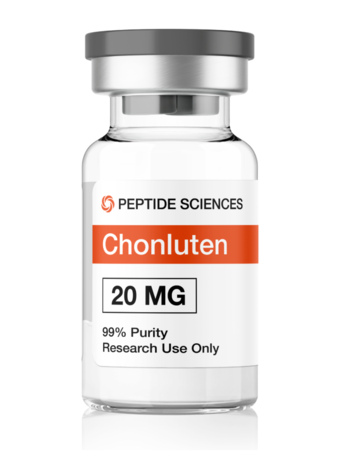Honluten is a short peptide bioregulator of gene expression. You can buy it in our online store. Studies have shown that it is most active in lung tissue with secondary levels of activity in the gastrointestinal tract. It regulates genes associated with inflammation and antioxidant activity, as well as genes involved in the proliferative response to inflammation. Regulation of the function of the mucous membrane of the lungs with the help
• Honlutena may have an important application in chronic inflammatory diseases of the lungs, such as asthma and COPD
Honluten, also called tripeptide T-34. Studies show that Honluten regulates the expression of genes encoding antioxidant and anti-inflammatory pathways, especially in the lungs and gastrointestinal tract. This may explain why honluten is often used as a geroprotective agent (slowing down or preventing the aging process), as well as an anti-inflammatory agent in the lungs, where it appears to normalize mucosal function in conditions such as COPD.
Tripeptides in bioregulation
Animal studies have shown that a number of small di-, tri- and tetrapeptides increase life expectancy by as much as 40%.
It seems that they do this in different ways, for example, by suppressing the development of both spontaneous and induced tumors. This fact, combined with a decrease in the rate of decline of age-related biomarkers, has led scientists to suggest that a number of tripeptides may regulate gene expression as well as cellular processes such as apoptosis.
Studies show that short peptides can regulate all aspects of gene expression, including epigenetic DNA methylation.
Modeling has shown that a single short peptide can regulate dozens of genes by penetrating both the cytoplasmic (cell) and nuclear membranes and binding directly to DNA through a simple docking method in promoter, suppressor, and other DNA control regions
Holuten, apparently, has tissue-specific activity in the lungs, changing the expression of DNA in such a way that it normalizes the mucous membrane of the bronchi. This inner lining of the bronchi is a barrier between the outside world, which we inhale with each breath, and the inner workings of our cardiovascular system and, ultimately, our entire body. Ego can be changed in various inflammatory conditions, such as asthma or COPD, which leads to changes in the production of mucus, the structure of the extracellular matrix, etc.
For example, a smoker's cough — this is an inflammatory disease that leads to chronic irritation of the mucous membrane and subsequent chronic cough, sputum secretion, and much more.
The effects of honluten appear to be mediated by several genes, including c-Fos, the health shock protein gene HSP70, SOD, COX-2, TNF-alpha, and genes of the antioxidant system. The regulation of most of these genes has an obvious anti-inflammatory effect. However, c-FOS is of particular interest. The c-FOS protein is a powerful general regulator of cell proliferation, differentiation, and survival. It is activated in response to cell damage and hypoxia. Although its effects at the local level can be useful, for example, the growth of new blood vessels and cell proliferation after injuries, widespread distribution can lead to thickening of the mucous membrane of the bronchi and even to the development of cancer.
The ability to regulate the activity of c-FOX makes it possible to influence one of the main pathophysiological changes observed in asthma and COPD
Chongluten and COVID-19
A peptide with an active anti-inflammatory effect is of obvious interest to scientists during the global Covid-19 pandemic.
Studies show that Honluten and its analogue Bronchogen are effective for the treatment of bronchopulmonary pathology. Holuten increases the effectiveness of standard therapy for chronic bronchitis with an asthmatic component and has a stress-protective effect.
Both of these features, combined with the fact that Holuten improves physical performance and the state of the body's functions in conditions of low oxygen content, can make this tripeptide a useful adjuvant in a multicomponent cocktail to fight against Covid-19
Honluten and gastrointestinal tract
The effects of honluten in the gastrointestinal tract are similar to its effects in the lungs, if they are muted. Studies show that it can be useful for reducing inflammation and vascular changes in the gastrointestinal tract that occur as a result of inflammatory diseases such as Crohn's disease and ulcerative colitis. Investigations of this aspect)* Honlutena continue.
Honluten Summary
Honluten is a short peptide regulator of gene expression. Apparently, it is most active in lung tissue with secondary levels of activity in the gastrointestinal tract. It regulates genes associated with inflammation and antioxidant activity, as well as genes involved in the proliferative response to inflammation. Regulation of the function of the mucous membrane of the lungs with the help of Honluten can have an important application in chronic inflammatory diseases of the lungs, such as asthma.
Honluten exhibits minimal side effects, low oral bioavailability and excellent subcutaneous bioavailability in mice. The dosage per kg for mice does not apply to humans. The sale of honluten by Peptide Sciences is limited to educational and scientific research only, and not for human consumption. Buy Honluten only if you are a licensed researcher.




There are currently no reviews for this product.
Your review will be the first.
Tell other users of the site about the advantages and features of the product, share your impressions and expert opinion.